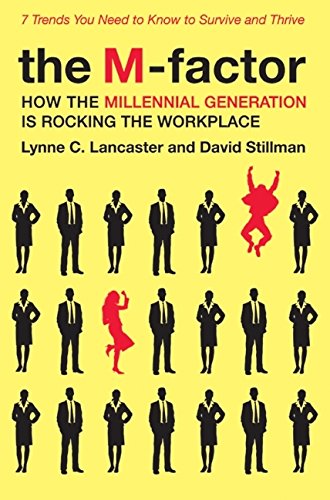AUTHOR:
Lynne C. Lancaster and David Stillman (HarperCollins Publishers, 2010)
REVIEWER:
Stephanie Lerner
BOOK LINK: https://goo.gl/f4UzBt
REVIEW:
In their book, Lancaster and Stillman identify seven trends that comprise the M-factor, the defining qualities of the generation born between 1982 and 2000. These include: the role of parents, sense of entitlement, search for meaning, their great expectations, their need for speed, the role of social networking and the significance of collaboration. These themes manifest themselves in the daily lives of the Millennials who can’t submit a paper in college without getting mom and dad to proofread it first, expect constant feedback and recognition for their hard work, and yearn for meaning in their jobs. The members of this generation have no problem telling their bosses that there is a better way to accomplish something, can be found constantly multitasking, rely heavily on Facebook and Twitter as survival tools for their buzzing social lives, and work better in teams than previous generations. This cohort, 76 million strong, is reshaping the workforce faster than you can say “tweet.”
From a not-for-profit perspective, this book sheds light on the ways in which the Millennials can best be engaged, both within and outside of the workplace. Lancaster and Stillman do an excellent job revealing what the Millennials expect both from their superiors and themselves. Understanding evolving trends among generations, in the context of philanthropic engagement, is particularly critical with regard to Millennials given that this generation ranks ‘making a difference’ the most important factor in their lives and is willing to sacrifice higher pay in order to do so. The book highlights how this generation seeks to support and be associated with companies that are civically engaged. It is also comfortable adopting new forms of giving, such as ‘crowdsourced’ philanthropy in which individuals have the ability to directly influence how a corporation spends its charitable dollars.
Ultimately, successful understanding and engagement of the Millennial generation is about finding common ground between it and its predecessors. Millennials, like all upcoming generations, will need to learn to respect past generations in order to benefit from the experiences of their generational forbearers. At the same time, Traditionalists, Boomers, and Xers will gain by appreciating that this up-and-coming generation, despite sometimes seeming attitudinally entitled, excessively dependent, and scattered in focus, is shaped by a set of values and beliefs which empower them in a unique way.
Each generation faces its own challenges. As older generations today are more involved than ever before in their adult children’s lives, Millennials are struggling to find a place for Grandma on Facebook. In short, this generation is successfully bringing innovative ideas to the development of social structures in a variety of areas — personal, professional, political and philanthropic. Optimal success for all will be best achieved to the extent that intergenerational differences are bridged.
Reviewed by Stephanie Lerner, Intern, The Andrea and Charles Bronfman Philanthropies and proud to be a Millennial




